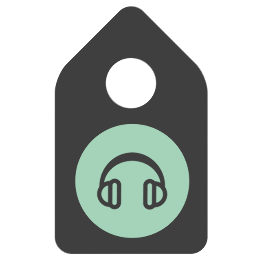PodTagger
PodTagger is a simple ruby script that reads a shownotes.raw.md (Markdown with YAML headers) file and applies the information in the headers using configured templates to a target MP3 file.
Requirements
PodTagger requires mid3v2 from the Python mutagen package. You can install it with pip. If you don’t already have pip installed, use sudo easy_install pip before running sudo pip install mutagen.
The application version (download below) includes mutagen, so it will run without any additional requirements.
Configuration
PodTagger reads a YAML config file with defaults, and YAML headers on podcast show notes. Start by creating a default configuration file in ~/.config/podtagger/ called podtagger.yaml. If you run it without creating this file first, it will automatically create an empty config for you.
podtagger.yaml
The podcast file contains the following keys:
default:
# Title of podcast
podcast: PODCAST NAME
# Name of host(s)
host: HOST NAME
# Podcast network name, blank if not applicable
network: NETWORK
# Format for adding header to output show notes
# Any meta key can be used within %% variables
title_format: "%%title%% with %%guest%%"
# Format for title added as ID3 tag
# Any meta key can be used within %% variables
ep_title_format: "%%title%% with %%guest%% - %%podcast%% %%episode%%"
# POSIX path to thumbnail image
logo: PATH/TO/THUMBNAIL
## Optionally add configs for podcast-specific keys
# PODCAST NAME:
# ep_title_format: "%%title%% with %%guest%% - %%podcast%% %%episode%%"
# title_format: "## %%title%% with %%guest%%"
# logo: PATH/TO/THUMBNAILAdding additional top-level keys with podcast names allows you to override settings on a per-podcast basis. If you only ever tag one podcast, you can just use the default: key/values.
If you have additional podcast configurations, they extend the default, meaning that keys that aren’t defined in that podcast section fall back to whatever is defined in default:. Thus, you only have to add keys for settings you want to override.
As an example, here’s my podtagger.yaml for Overtired and Systematic.
default:
podcast: Systematic
title_format: "## %%title%%"
ep_title_format: "%%title%% - %%podcast%% #%%episode%%"
network: ESN.fm
host: Brett Terpstra
Systematic:
ep_title_format: "%%title%% with %%guest%% - %%podcast%% %%episode%%"
title_format: "## %%title%% with %%guest%%"
logo: /Users/ttscoff/Desktop/Systematic-esn-thumb.jpg
Overtired:
host: Christina Warren & Brett Terpstra
ep_title_format: "%%title%% - %%podcast%% #%%episode%%"
logo: ~/Desktop/overtired-thumb.jpgAs you can see, the Systematic values only override the title formats (see “Format strings” below) and add a logo. The Overtired values override the host tag, the logo, and the episode title format (the one used on the MP3, not in the show notes).
Any of these values can be overridden by the YAML data in an episodes notes file.
Format strings
The keys ep_title_format and title_format use variables delineated by 2 percent symbols on either side: %%variable%%. The variable name can correspond to any keys defined, such as %%podcast%% or %%title%%. You can also include custom keys in your shownotes.raw.md headers (see below) which are then available as variables. For example, my Systematic show notes include a key for guest:, which I can then use in the format string: "## %%title%% with %%guest%%".
Show Notes
PodTagger reads a YAML header from a file called shownotes.raw.md in the same directory as the mp3 file you’re tagging.1 After PodTagger finishes, it will write out the show notes with the YAML removed to a file called shownotes.md. The rest of the file after the YAML headers can be any information you want. I use it for description, sponsor info, and show links, but it’s for whatever you’d post on a show landing page.
The shownotes.raw.md file would look something like this:
---
description: "Lawyer, blogger, podcaster, and Mac productivity guy, David Sparks joins Brett to talk about freelancing, saying no to projects, and the latest and greatest top 3 picks."
episode: 185
guest: David Sparks
---
# Too Busy
This episode is sponsored by TextExpander for Teams, making all of your team's common replies consistent and easily accessible. Learn more (and support Systematic) at [textexpander.com/systematic](https://textexpander.com/systematic?utm_source=systematic&utm_medium=podcast&utm_campaign=textexpander-feb17
).
...Note that you can include a title: meta key, or just make an h1 or h2 (# title or ## title line) in the show note body. Either will generate the title and format it based on format strings in the configuration.
Usage
Use the following command (along with optional flags) to run podtagger. The shownotes.raw.md file must exist in the same directory as TARGET.mp3.
Usage: podtagger [options] TARGET.mp3
Options:
-d, --debug Show debug output
-v, --verbose Verbose output
-c, --config=CONFIG Use alternate configuration file
--no-color Colorize output (default)
--html Output HTML status messages
-h, --help Display this screenChangelog
Click to expand
1.1.0
- Add metadata at top of shownotes for title, duration, and filesize
- Various fixes and improvements
1.0.1
- added command line options (debug, verbose, color, help)
- added colorized output
- added html output for use with Platypus
- change default show notes file to
shownotes.raw.md - moved config to
~/.config/podtagger/podtagger.yaml
Download
PodTagger v1.1.0
PodTagger.app v1.1.0
-
If
shownotes.raw.mddoesn’t exist butshownotes.mddoes,shownotes.mdwill be copied to .raw.md and then overwritten without the YAML headers. ↩
Speaking of PodTagger…
